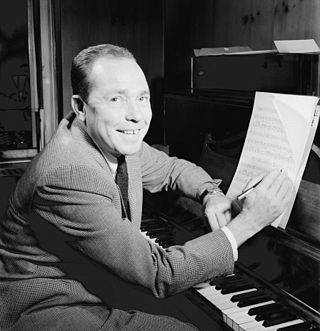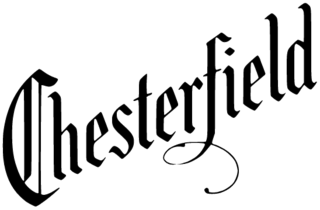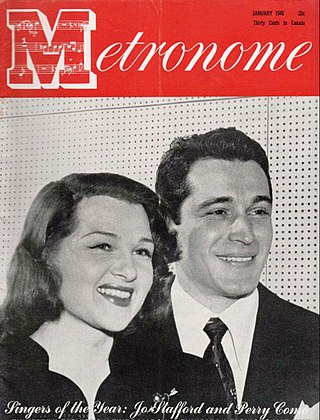
John Herndon Mercer was an American lyricist, songwriter, and singer, as well as a record label executive who co-founded Capitol Records with music industry businessmen Buddy DeSylva and Glenn E. Wallichs.

Jo Elizabeth Stafford was an American traditional pop singer, whose career spanned five decades from the late 1930s to the early 1980s. Admired for the purity of her voice, she originally underwent classical training to become an opera singer before following a career in popular music, and by 1955 had achieved more worldwide record sales than any other female artist. Her 1952 song "You Belong to Me" topped the charts in the United States and United Kingdom, becoming the second single to top the UK Singles Chart, and the first by a female artist to do so.

The Pied Pipers were an American popular singing group originally formed in the late 1930s. They had several chart hits throughout the 1940s, both under their own name and in association with Tommy Dorsey, with Johnny Mercer and with Frank Sinatra.

Paul Weston was an American pianist, arranger, composer, and conductor who worked in music and television from the 1930s to the 1970s, pioneering mood music and becoming known as "the Father of Mood Music". His compositions include popular music songs such as "I Should Care", "Day by Day", and "Shrimp Boats". He also wrote classical pieces, including "Crescent City Suite" and religious music, authoring several hymns and masses.

Chesterfield is a brand of cigarette, named after Chesterfield County, Virginia. The brand is owned by conglomerate Altria and produced by its subsidiary Philip Morris USA.
The Mickey Mouse Theater of the Air was a 1938 musical-variety radio series for children, sponsored by Pepsodent and heard on NBC on Sunday afternoons, featuring Mickey Mouse and other characters from Walt Disney cartoons. There were a total of twenty broadcasts from the Disney Little Theater on the RKO lot from January 2 to May 15, 1938, the program was created to promote the February 1938 release of Disney's first animated feature film, Snow White and the Seven Dwarfs. In addition to Snow White featured in the second episode, the series featured other fairy tale and nursery rhyme characters, including "Mother Goose Land," "Cinderella," "King Neptune," "The Pied Piper," "The Old Woman in the Shoe" and "Old MacDonald".
"Ac-Cent-Tchu-Ate the Positive" is a popular song which was published in 1944. The music was written by Harold Arlen and the lyrics by Johnny Mercer. The song was nominated for the Academy Award for Best Original Song at the 18th Academy Awards in 1945 after being used in the film Here Come the Waves.

The Chesterfield Supper Club is an NBC Radio musical variety program (1944–1950), which was also telecast by NBC Television (1948–1950).

Blondie is a radio situation comedy adapted from the long-running Blondie comic strip by Chic Young. It stars Arthur Lake as Dagwood Bumstead and, for the majority of its run, Penny Singleton as Blondie Bumstead. The radio program ran on several networks from 1939 to 1950.
"Candy" is a popular song. The music was written by Alex Kramer, the lyrics by Mack David and Joan Whitney. It was published in 1944.

After Perry Como left the Ted Weems Orchestra in late 1942, he returned to his home in Canonsburg, Pennsylvania with the idea of going back to his barbering profession. Como had many offers before and after he was back in his home town. As he was preparing to sign a lease to re-open a barber shop, he received a telephone call from Tommy Rockwell, who was with General Artists Corporation. Rockwell, who also represented Ted Weems, offered Como a sustaining (non-sponsored) radio program on CBS and also to get him a recording contract. The offers made by Rockwell meant remaining in New York to perform with no more road tours as had been the case for many years when Como was with both Freddie Carlone and Ted Weems. On the advice of his wife, Roselle, Como agreed to go to New York as it meant he could continue working in the music business and not be separated from his family.

Club Fifteen is a radio program in the United States that featured popular music. It was broadcast weeknights 30 June 1947 – 21 December 1951. Then, it aired Monday, Wednesday, and Friday nights until 16 January 1953. The name reflected the program's length—15 minutes. The Historical Dictionary of Old-Time Radio noted that the show "is sometimes listed as Bob Crosby's Club Fifteen because Bob Crosby was the original star, although Dick Haymes took over in 1949-50." The program was sponsored by Campbell Soups.

The Jack Smith Show was a radio program of popular music in the United States. It was broadcast on CBS Aug. 21, 1945-Dec. 26, 1952. It first originated from New York, but production was moved to Hollywood in 1948 to allow more opportunities for Smith to work in movies.

The Frank Sinatra Show was a title applied—in some cases specifically and in other cases generically—to several radio musical programs in the United States, some of which had other distinct titles as indicated below. Singer Frank Sinatra starred in the programs, some of which were broadcast on CBS, while others were on NBC.
The Pepsodent Show is an American radio comedy program broadcast from 1938 to 1948, during the Golden Age of Radio. The program starred Bob Hope and Jerry Colonna, alongside Blanche Stewart, Elvia Allman, and a continuously rotating supporting cast of actors and musicians which included, for a time, Judy Garland, Frances Langford, and Desi Arnaz and his orchestra.
The Bob Crosby Show can refer to any of several old-time radio musical variety program in the United States. They were broadcast on CBS, Mutual and NBC, with the first beginning in 1935 and the last ending in 1950.

Call for Music is an old-time radio program in the United States. It was broadcast on CBS February 13 – April 16, 1948, and on NBC April 20 – June 29, 1948. The title was adapted from the sponsor's signature radio tag, "Call for Philip Morris."

The Dinah Shore Show was a title applied—in some cases specifically and in other cases generically—to several radio musical programs in the United States, some of which had other distinct titles as indicated below. Singer Dinah Shore starred in the programs, some of which were broadcast on the Blue Network, while others were on CBS or NBC.

The Jack Carson Show is an American old-time radio comedy-variety program. It was broadcast on different seasons on CBS and NBC, beginning on June 2, 1943, and ending on December 20, 1956. The program was also known as The Sealtest Village Store, and the New Jack Carson Show. It was carried on the CBC Dominion network in Canada, as well. Additionally, The Jack Carson Show is the title of a television program that was broadcast on NBC from October 22, 1954, until March 11, 1955.













